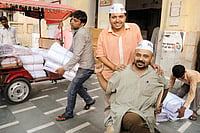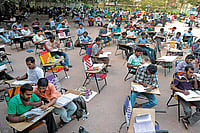| A Managed Show | Profile of a Company | |
|
| |
***
On Gandhi Jayanti, October 2, in 2013, the Manmohan Singh PMO received an anonymous letter. “UCIL mein sab kuchh chalta hai (anything goes in UCIL),” it read. “Baap bete ka interview le raha hai (the father is interviewing the son).” The letter was referring to the selection of two management trainees at the Uranium Corporation of India Ltd (UCIL) at Jaduguda, near Jamshedpur in Jharkhand.
The PMO duly forwarded the letter to UCIL, and the Department of Atomic Energy, under which it falls. A relatively small but significant public sector undertaking with an annual turnover of around Rs 800 crore, the corporation alone can legally mine uranium to meet the country’s growing nuclear energy needs. It has recruited 130 management trainees between 2003 and 2013, but it was only when Rajnish Rai, IPS, was posted to UCIL as chief vigilance officer in August 2014—the first outsider to be appointed to the vigilance cell—that the rot in recruitments came to the fore. A Gujarat cadre officer, Rai had been instrumental in arresting several police officers in the Sohrabuddin Sheikh fake encounter case, in which present BJP president Amit Shah too had been named. Rai had then sought a posting outside Gujarat, but when posted to UCIL, he challenged the appointment complaining of downgrading, won a decision in his favour, and has recently moved to the CRPF as DIG.
But Rai made good use of the brief period he spent at UCIL. In a 216-page report that he submitted in February this year (available with Outlook) to the DAE, CVC and the CBI, Rai drew attention to irregularities in recruitments at UCIL for the past decade or so. “In the past several years, these illegal and arbitrary procedures of recruitment and selection have almost become natural and normal in UCIL. All these recruitments prima facie suffer from the vice of arbitrariness, discrimination, unreasonableness, non-uniformity and abuse of discretion,” he writes in the report. If the ongoing inquiry finds the allegations to be true, it could take the lid off one of the most serious recruitment scandals involving PSUs.
In 2013, for example, UCIL received 1,700 applications for two management trainee posts and invited 40 for an interview. How they were shortlisted, no one knows. The Department of Public Enterprises mandates that the selection of management trainees in all PSUs be done on an all-India basis through a written exam followed by a personal interview. UCIL has not held one in the last 10 years. For the interviews, the report notes, there were no uniform criteria, scale, benchmark or marks to evaluate candidates. Even educational qualifications have not been considered.
Since he was a solitary officer working without an assistant in the vigilance cell, Rai could not look into every individual appointment made in the last decade. He, however, did manage to establish that each recruitment round was conducted without heed to any due process. He, therefore, requested the DAE to investigate individual recruitments in greater detail. “We have ordered a preliminary departmental inquiry into the matter, to be conducted by a senior officer. The inquiry is in progress and further action will be initiated upon receipt of the inquiry report,” O.T.G Nair, deputy secretary, DAE, told Outlook.



Rai’s report
Curious Case of the Director’s Son: It was, however, the appointment as assistant manager of Vivek Shrivastava, son of director (technical), S.K. Shrivastava, that the anonymous letter to the PMO called attention to. Following inquiries by the PMO and the DAE, CMD Diwakar Acharya responded with a letter in November 2013, declaring that Vivek was found suitable according to the “strictly laid down procedure of the company”. His father, S.K. Shrivastava, was “neither involved in the selection process nor was in a position to influence it”. The DAE wrote four letters to UCIL asking:
- How candidates were shortlisted without a written examination;
- What was the method followed in constituting the selection committee;
- The criteria for allotting marks in the interview; and
- The method followed for drawing up the merit list.
The DAE recorded responses to each of these letters as incomplete, vague and evasive. Addressing these very queries, Rai found systematic attempts by UCIL officials to “destroy existing records and fabricate new documents to cover up glaring illegalities”. His detailed report establishes Vivek’s appointment overlooking several other deserving candidates to be irregular if not illegal. According to his report, contrary to the claims of the CMD, S.K Shrivastava was fully involved in the selection process and was also on the interview board. Shrivastava Sr was initially part of the selection committee, but his name was dropped at the last moment and that of general manager S.K. Guha Niyogi included in his place. Guha Niyogi, incidentally, is cited as the first referee in Vivek’s application. Rai’s report also claims says that the shortlisted candidates, including Vivek, were interviewed by S.K. Shrivastava. Neither father nor son made the mandatory declaration of a close relative appearing for the interview or working in the company.
In an interesting twist, the report also says Vivek was unfit for employment due to his colour-blindness. Once the medical disability was conveyed to Shrivastava Sr, CMD Acharya asked the UCIL chief medical officer, Dr Majhee, to find a way to ‘help’ the candidate and suggested taking a second opinion. On November 1, 2013, Dr Majhee, the report says, personally took Vivek to mgm Medical College Hospital, Jamshedpur, where his vision was declared to be normal. Armed with the fresh opinion, the company issued an appointment letter. Following an inquiry into this, company secretary and Rai’s predecessor as CVO, B.C. Gupta, wrote, “I found the certificate issued by cmo, UCIL Hospital, and the alleged colour-blindness of Vivek Shrivastava mentioned nowhere”. Rai’s report notes that Gupta has “conducted the inquiry in the most perfunctory manner and facilitated creation of ante-dated documents to mislead the CVC and the DAE”. Outlook reached out to the UCIL chairman for a response but Acharya, CMD for the past three years, refused to comment. Rai too refused to comment.


























